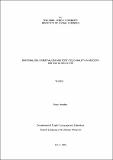Please use this identifier to cite or link to this item:
http://hdl.handle.net/11547/1939| Title: | IMPERIALISM, ORIENTALISM AND POST-COLONIALITY IN MODERN BRITISH LITERATURE |
| Authors: | Soydan, İlknur |
| Keywords: | Imperialism Colonialism Colonial Representations Emperyalizm Sömürgecilik Sömürgeci Temsiller |
| Issue Date: | 2015 |
| Publisher: | İSTANBUL AYDIN UNIVERSITY INSTITUTE OF SOCIAL SCIENCES |
| Abstract: | In this thesis study, the colonial representations of the colonizer and the colonized are examined in the two important literary works in English Literature, namely Heart of Darkness by Joseph Conrad and A Passage to India by E. M. Forster. Together with these, the attitudes of these two writers towards imperialism and colonialism are scrutinized in the light of their above-mentioned books and the secondary sources related to the issue. In the colonial discourse and accordingly in the above literary works, the colonizer is usually represented as the superior race that has positive qualities which the colonized do not have. The colonized is shown as the inferior race that has various negative qualities, so that the colonized is the Other and the colonizer is not. At the same time, it is seen that the colonizer‘s attitudes and behavior may be better towards the colonized when the latter mimics back toward the former. However, even if colonized natives mimic the colonizer as in Bhabha‘s mimicry, they become like the colonizer, but not quite. The colonized becomes the mimic of the colonizer, but not quite, so the former is both the mimic of the colonizer and not like the colonizer himself or cannot be like him with all of his privileges. In other words, the colonized is neither the original native anymore after the mimicking process nor like the original colonizer himself with all his superior qualities, so the colonized‘s situation and thus colonial situations and representations are ambivalent and this negates the power of colonial representations. As has been shown in the literature in the field and especially in Forster‘s A Passage to India, the colonized must commit an error, do something excessively or have a lack in something so that the colonizer could keep their supremacy and thus their colonial authorityover the colonized. While these main issues of representation are examined, the effects of imperialism and colonialism upon the colonized, the colonizer, the animals, the plants, nature, and the environment are also reflected and explored in this study. As a result,it has been seen that the negative consequences of imperialism and colonialism have affected all the parties, whether the colonizer or the colonized, the animals or the people, the plants or the environment. The attitudes of the writers of the two above books towards imperialism and colonialism are also delineated as the other main issue. Considering the evidence from the texts of the above two books and the secondary sources, the colonial representations of the colonizer and the colonized that these writers use in their above-mentioned books, can be said to be utilized both as a criticism of these imperialistand colonialist representations by showing their awareness of these stereotypes and as a background for their novels which is familiar to the reader of those imperial and colonial days. In this way, the criticism of these two books on imperialism and colonialism would appear milder to the readership in their period of publication in the era of imperialism and colonialization while at the same time it would make the readers more aware of the detrimental and painful effects of imperialism and colonialism on the colonized, the colonizer, animals, plants, nature, and the environment. |
| URI: | http://hdl.handle.net/11547/1939 |
| Appears in Collections: | Tezler -- Thesis |
Files in This Item:
| File | Description | Size | Format | |
|---|---|---|---|---|
| 407074.pdf | Tez dosyası | 1.17 MB | Adobe PDF |  View/Open |
Items in DSpace are protected by copyright, with all rights reserved, unless otherwise indicated.
